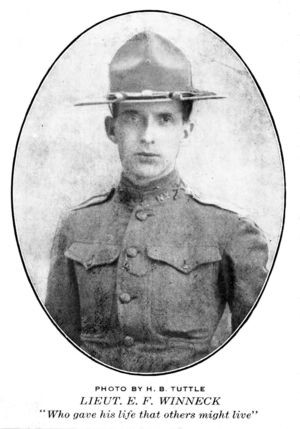
Lieutenant Edward Francis "Frank" Winnek Post 396, Geneva, NY. Edward Winnek was born in 1888. There is little information on his life before military service. The Winnek family doesn't appear in the Geneva city directory before 1894. In that year, Frank's father, James, is listed as a stove mounter for Phillips and Clark Stove Company. James worked for the company the rest of his life; the family, nine children in all, lived nearby on East North Street. Frank attended Lewis Street School; participated in programs for Christmas and Arbor Day. He doesn't appear in commencement issues of Geneva High School News and may have completed his education in the eighth grade. Beginning in 1911, Frank was listed as an insurance agent and had a wife and two children. In December 1907, Frank joined Geneva's Company B, National Guard of the State of New York. He was promoted to corporal in 1911, to sergeant two years later and to first sergeant in late 1914. Frank was commissioned second lieutenant in 1915 and promoted to first lieutenant in 1917. In April 1913, along with the rest of Company B, Frank went to Buffalo to keep the peace during a streetcar workers' strike. They were sent to the Mexican border during the summer and fall of 1916. The unit was activated for World War I in the spring of 1917 and received training at Camp Wadsworth in Spartanburg, S.C. Company B shipped overseas in May of 1918 as part of the 27th Division (which still exists today). The 27th and 30th Divisions of the American Expeditionary Force were used to break through the Hindenburg Line, the German defensive fortifications in France. In late September 1918, the major attack began; Frank Winnek was killed on September 29. The first public report of Winnek's death, and other casualties that day, didn't appear in the Geneva Daily Times until November 1. The paper quoted several letters from soldiers that reached Geneva about the same time, including one from Frank's younger brother, Charles, to their Mother. "Dear Mother, I suppose by the time you get this letter you will have been officially notified of Frank's death. He was killed in action on September 29th and was buried the following day at St. Emilie (actually Somme American Cemetery in Bony). I saw him the night before he went into the lines and he was as cheerful as ever, because he was in charge of the company...I was told...that he was wounded but not seriously. He bandaged the wound up himself and went on with his men but had not advanced far when a sniper got him and he died shortly after...I am alright having come through the battle without a scratch but feel broken-hearted over Frank." The article mentioned that "eight or nine" more men of Company B were killed that day, including Sergeant Earl Lautenslager. By the end of the war, 35 men from Geneva had lost their lives. Fourteen were killed in action, six died of wounds and the rest died of disease. The national American Legion was founded in 1919 by World War I veterans. The Geneva post was founded September 6 of that year and named in honor of Frank Winnek. Meetings were held at the Armory on Main Street; from 1922 to 1927 the post had use of a house next door to the public library. In 1927 the post purchased a home on Milton Street, now owned by the Knights of Columbus. After World War II, Winnek Post grew from 250 to more than 600 members. Needing a larger home, they purchased the current building on Lochland Road next to Belhurst Castle. Expansions and improvements over the years included the banquet hall, swimming pool and bar and lounge areas. A major fundraiser for these projects has been the Legion Festival on July 3rd of every year. Originally a four-day event in 1960, it is now held on one day ending with a fireworks display that for many locals signals the beginning of the July 4th holiday. In addition to supporting itself, the post has donated thousands of dollars over the years to local and regional community service projects.
